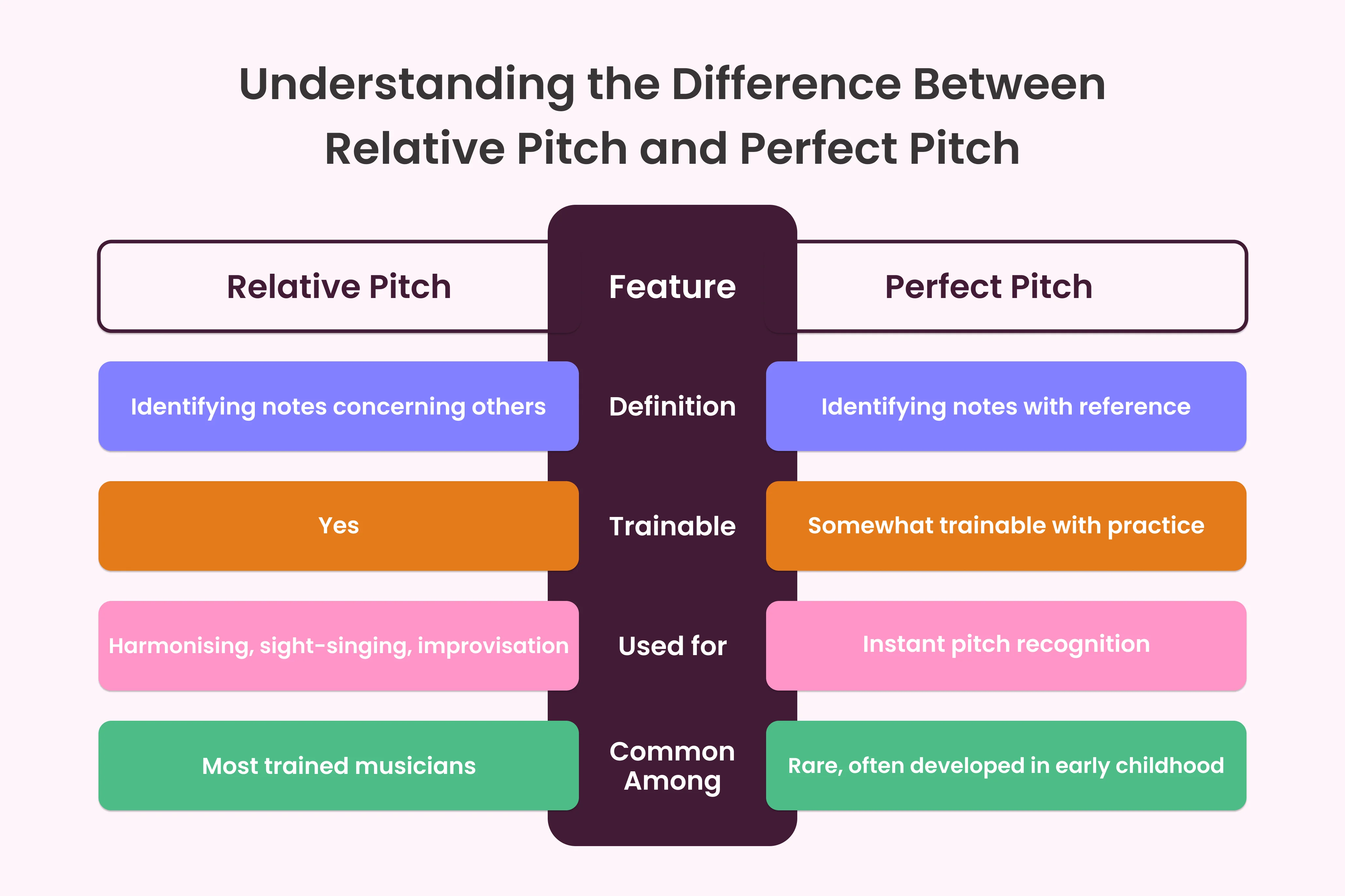What is the most important element that makes a singer confident?
Mastering your voice? Well, that is just a part of the equation. The real magic occurs when you start hearing music in a new way, and this is where ear training comes into play. If you see singers matching pitch effortlessly or improvising harmonies quickly, then understand that it is not just a talent but also trained listening skills.
So, what is ear training? It is precisely as the name suggests. It is a process of developing a musician’s ability to identify and create musical sounds, such as notes, intervals, rhythms, and chords, by ear. This is one of the most vital skills a singer can have. It helps sharpen pitch accuracy, strengthen music memory, and boost the ability to sing in tune and harmonize with others.
Let’s explore how ear training can transform your singing and the exercises that can get you started.
What are the Benefits of Ear Training for Singers?
Singers are unique because, unlike other musicians, their instrument resides within them. They rely on their muscle memory and ears to guide pitch and tone. So, without proper training, even the best singers can fall short. Here is how ear training helped renowned singers:
- Pitch Precision – Hit the right notes consistently
- Better Intonation – Helps to stay in tune, especially in group singing
- Improvisation Skills – Stay better prepared to anticipate harmonic progressions and improvise smoothly
- Musical Memory – Recognising patterns and motifs becomes easier
- Confidence – Become more confident and trust your instincts
So, whether you are singing Hindustani classical music or Western music, the benefits of ear training remain universal. That is why it is at the heart of our online music classes.
Why Is Ear Training So Hard?
If you’re new to singing, you may find this exercise challenging. You know why? Because training for the ear is about perception, unlike learning a song or a scale, which is about memorization. While ear training, your brains hear the details you may have never noticed before.
To sum it up, the good news is that ears can be trained just like any other muscle. But with the right approach and consistent practice, even you can develop this superpower.
5 Practical Ear Training Exercises
Here are some proven exercises used in online singing lessons that you can start today:
- Sing Simple Intervals
Start with two-note combinations. Try singing:
- Major second (Do-Re) – This step is small and commonly found in many melodies.
- Perfect fourth (Do – Fa) – A strong and familiar leap often used in anthems or classical pieces.
- Major third (Do – Mi) – A slightly wider interval that adds sweetness and brightness to a tune.
First, use a piano or a digital keyboard app to play the notes, then try to match them with your voice. This helps you train your pitch accuracy and develop muscle memory for how different intervals “feel” when sung.
- Identify Note Direction
Pick a familiar melody like Happy Birthday or Twinkle Twinkle Little Star. As you sing, ask yourself:
- Are the notes ascending (going higher) or descending (going lower)?
- Are they moving in steps (close together) or leaps (big jumps)?
This activity helps develop your internal pitch sense and understanding of how melodies move, which is crucial for singers’ ear training.
- Call-and-Response Singing
This classic technique builds your ear through imitation. Ask a friend, teacher, or use an online ear training tool to:
- Sing short 3–5 note phrases.
- Then, repeat them exactly, matching the pitch, rhythm, and tone. It sharpens your musical memory, strengthens pitch matching, and enhances your tonal accuracy.
Over time, you’ll start to recognize and reproduce melodies more naturally.
4. Clap Rhythms
Ear training isn’t just about pitch—it’s about rhythm, too. Listen to a song and:
- Tap or clap along with the beat and try mimicking the rhythmic pattern.
Start with slower tracks and gradually move to more complex rhythms.
This helps develop your timing, which is as important as hitting the right notes when performing.
5. Sing Solfège
Practising solfège strengthens both your musical ear and your voice. Start by singing:
- The major scale uses Do-Re-Mi.
- Then practice standard intervals and patterns (like Do–Mi–Sol or Do–Fa–Mi–Re–Do).
This method trains your brain to associate note positions with aural recognition, making it easier to sight-sing or learn new melodies by ear.
Read About: Top 10 Ways to Become a Better Singer
How Can I Train My Ear to Recognize Notes?

For a singer, ear training to recognize notes is crucial. This is detrimental to being able to collaborate with other musicians. That being said, there are two main types of pitch recognition:
- Relative pitch
The art of recognizing the relation between each note is called relative pitch. For example, if you know what a C note sounds like and acknowledge that the following is an E note (a major third part), you are using relative pitch.
- Perfect pitch
Also known as absolute pitch, this identifies a note without any reference. Not everyone is born with it, but you can get close through perfect pitch exercises.
Most singers start with relative pitch, and that’s more than enough to become great.
Most online ear training focuses on relative pitch, which we reinforce in our Artium curriculum.
Read About: 10 Vocal Exercises for Beginners
Easy Tips to Improve Ear Training Faster

- Be Consistent: Practice 10-15 minutes daily. It’s more effective than long weekly sessions.
- Use Apps & Tools: Ear training apps can complement your practice.
- Record Yourself: Listen back to assess if your pitch matched the note.
- Listen Actively: Whether it’s Indian classical or Western jazz, try to follow the scale or note transitions.
- Sing Along: Pick your favorite songs and sing along. Try to match the singer’s pitch and phrasing.
These are basic habits we help students build in our online singing classes.
Your Path to Better Pitch Starts Here
Hearing and interpreting music accurately is one of the most empowering tools a singer can have. With consistent ear training, you’ll sing better, feel the music deeply, connect with your audience, and express yourself more confidently.
Artium Academy provides ear training as part of its online music courses, especially in Western music and vocal training sessions. The online music learning platform also combines time-tested ear training exercises with structured online music lessons tailored to each student’s pace.
Whether you’re a child just starting out or an adult rekindling your love for music, our online singing classes will help you unlock your full potential.
Ready to tune your ears and transform your voice?
Book a Free Trial Today at Artium Academy, master ear training, and start your singing journey today.
FAQ
Q. Why is ear training necessary for singers? Can’t I just focus on vocal techniques?
Ans: A singer’s voice is their instrument. Singers rely on their ears to guide pitch, harmony, and rhythm unlike other instruments. Focusing on vocal techniques may help, but singers may find it challenging to sing in tune, harmonize, or improvise without trained listening skills.
Q. Is ear training difficult for beginners? Will my child struggle with it?
Ans: Training ears is not difficult for a beginner. While it may feel unfamiliar, you can consistently improve this skill. At Artium Academy, we break down ear training into simple, age-appropriate exercises like clapping rhythms, singing solfège, and pitch-matching games, making it engaging and fun for children, beginners, or hobbyists alike. The key is short, regular sessions and a guided approach.
Q. How does Artium Academy teach ear training in its online singing classes?
Ans: We have seamlessly integrated ear training into our online vocal course, like Western and Indian classical music programs. Students learn through Live 1:1 coaching with expert mentors, Call-and-response exercises, Solfège drills, Rhythm clapping and melodic playback, and Access to our Practice Studio, where they receive instant feedback and can track their pitch accuracy over time. All training is customized to the student’s pace and musical goals.
Q. How long does it take to see improvement in pitch accuracy through ear training?
Ans: Daily practice for 10-15 minutes can improve pitch accuracy and confidence within a few weeks. Continued practice strengthens memory, response time, and tonal control. Progress depends on how regularly the student engages with the exercises, which we encourage through structured lesson plans and weekly goals.
Q. Can ear training help me sing better, even if I’m not planning to become a professional singer?
Ans: Yes, of course. You don’t have to become a professional singer to train your ears. It’s for anyone who wants to sing confidently and accurately. Whether you are a hobbyist, a parent singing with your child, or someone rekindling with an old passion, ear training helps you stay in tune, understand your singing, and feel connected to your music. It turns guesswork into musical instinct—and that’s rewarding at any level.
Q. Do ear training exercises work?
Ans: Ear training exercises work, and they’re one of the most effective ways to improve your musical ability over time. Ear training exercises for singers help you develop pitch accuracy, recognize melodies, match notes effortlessly, and understand rhythm more intuitively. With consistent practice, even beginners notice measurable improvements in how confidently they sing, harmonize, or respond to music.
Q. How do you practice ear training?
Ans: You can practice ear training through simple, structured exercises that improve different aspects of musical hearing. Some effective methods include: 1) Singing intervals like Do-Re or Do-Mi to train pitch recognition. 2) Clapping along to the rhythms in your favorite songs. 3) Solfège exercises (Do-Re-Mi) to connect sound with scale positions. 4) Call-and-response singing, where you repeat short melodies by ear
Identifying note direction (whether it goes up or down in a melody)
Q. How long does it take to learn ear training?
Ans: Like learning a new language, Ear training exercises for beginners is a gradual process, and the timeline varies from person to person. With 10–15 minutes of daily practice, most students begin to see improvement in pitch-matching, rhythm sense, and musical confidence within 3 to 4 weeks. Continued practice brings more profound benefits like improvisation, harmony recognition, and better musical memory. The key is consistency over duration.
Q. Where to start with ear training?
Ans: The best way to start is with basic interval recognition and simple rhythm clapping: 1) Begin by listening and singing small intervals, such as Do–Re (major second) or Do–Mi (major third). 2) Try clapping to a slow, familiar song and count the beats (1–2–3–4). 3) Use a piano app or keyboard to play and match notes vocally. 4) Sing simple solfège patterns (Do-Re-Mi) to build familiarity with pitch positions.













